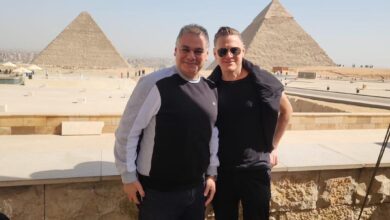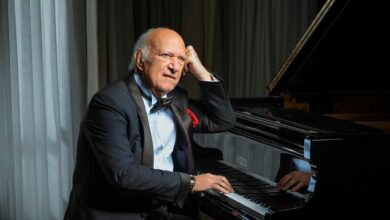Eftekasat, an Egyptian jazz band founded in 2001 by pianist and composer Amr Salah, performed yesterday at the closing ceremony of the Cairo Jazz Festival at the El Sawy Culture Wheel, just a few meters away from the quiet flow of the Nile.
Amr Salah, sitting at his shiny grand piano, strummed the first notes which resonated across the venue as a thick curtain of colored smoke filled the stage.
The smooth beginning of the song grew into a musical crescendo with all the instruments–the nay (a reed oblique flute), violin, drums, bass, percussion and electric guitar–distilling their own personality and universe.
Suddenly, the music switched from a regular western jazz style to an Oriental mood, led by Mohamed Medhat’s lyrical violin.
“The band, since its creation in late 2001, has pioneered experimentation with a fusion of Oriental vibes and contemporary jazz,” said Medhat, speaking to Al-Masry Al-Youm before the concert. The highly talented violin player joined the formation in 2005. Prior to that he was a member of the acclaimed Cairo Symphony Orchestra.
Each of Medhat’s fevered solos on stage made the crowd roar with pleasure and get onto their feet, ecstatic. “Playing a solo on stage can be very stressful,” said Medhat. “You need to be somehow disconnected from the surroundings to be really good, while maintaining a link with the audience because it is them who give you the energy you need to play."
On a nearby couch backstage was composer and musician Amr Salah, sitting perfectly still with eyes closed, concentrating before the performance. He told Al-Masry Al-Youm the story of his band.
“I started playing the piano at the age of six, under the close scrutiny and constant supervision of my mother, who is a piano teacher,” Salah said. The sensitive pianist was immersed in music his whole life but really only started playing full time the day he joined pharmaceutical school.
“It’s no wonder that I chose to study a subject close to chemistry, because I always loved mixing things together and observing the result,” said Salah. His passion for fusion and daring musical blends are clear in his composition, as if he is trying to bridging a gap between cultures through the sensibility of a harmony.
“My dream was to have a formation of musicians similar to the jazz trio, or quartets with a regular classical piano, bass, drums and a solo Oriental instrument,” said Salah, “and the nay struck me as the best choice for a solo instrument, as its sonorities are very Oriental.”
As for composing, Salah compared the intrusion of a new musical idea into his mind with the ringing of a telephone: “A melody can strike me and ring into my ears repeatedly until I sit in front of the piano and release it."
Eftekasat’s first album, “Mouled Sidi el-Latini” (The Latin Dervish), was released in 2006 and offers a fusion of Latin American and Oriental jazz.
“The first album offered a lot of space for personal expression and solos,” explained Medhat, “whereas the one we are finishing now is all about harmonies and ensembles.”
According to Salah, their coming album, “Dandasha,” will be released within the next two months and includes two songs with lyrics. “One of the songs is a ballad sung by Wust El Balad’s lead singer Hany Adel, and the second is a folkloric song from Upper Egypt in the traditional Saidi style."
As for composing, Salah said, “A melody can strike me and ring into my ears repeatedly until I sit in front of the piano and release it.”
On stage, Eftekasat’s songs stretch like an unending melodic ribbon that delicately wraps itself around the audience, mesmerizing and enthralling. The concert ended with a prolonged musical climax, each musician giving his all, playing energetically to rouse the audience into a state of fever.
The band’s last song was followed by the appearance onstage of the composer Omar Khairat, who was honored with a trophy for his lifetime achievements.




